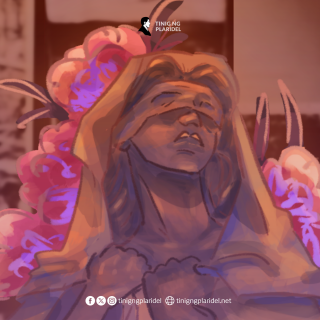Silence is most sobering when it follows a day that needs to be on full volume.
With placards packed in bags and fists lowered, protesters begin their journeys home on the same streets they had filled moments before. Car horns and commuters now replace the clamor for change, but contemplation remains.
There is still work to be done. What to do and where to go next?
After days of protest, one knows that life cannot simply return to normal. Not when movements become ever-growing, not when “normal” has been tainted to mean “unjust.”
Such tainted notions of normalcy take center stage in Bloom Where You Are Planted, Cinemalaya’s 2025 Best Film. Directed by Noni Abao, it follows three land rights activists in Cagayan Valley as they resist repression and continuously redefine what it means to call a place home.
The 82-minute film anchors on development worker Agnes Mesina, cultural artist Amanda Echanis and slain peace consultant Randy Malayao. While Mesina and Echanis personally appear in the film, Malayao’s narrative is instead relayed through his childhood friend and colleague Raymund Villanueva.
The film vibrantly captures the lush Cagayan Valley landscape, but audiences cannot ignore the farmers toiling amidst these shots. When paired with Mesina’s accounts of the landless farmers’ increasing debts and the concentration of land ownership, reality — and the need for a better one — becomes apparent.
RELATED: When cries of hungry farmers are stifled with bullets
The subjects formed connections with the audience through the film’s multimedia approach, incorporating footage of the three activists with their loved ones and the community of farmers in the region.
Voice recordings from Echanis stand out for their sincerity, tugging at heartstrings and leaving no dry eyes at the cinema. They are dense with revelations that can only arise when feelings are named, spoken about and sat with.
Some are solemn, as if a secret being entrusted to the audience at a late-night kwentuhan. Some understandably grow thicker with emotion midway, like a lump in one’s throat that becomes impossible to ignore.
In one recording, Echanis tearfully reads aloud a poem about her parents’ relationship as they navigate love and tragedy through activism.
In another recording addressed to her son about the life paths that unfold from joy or sadness, she declares, “This, too, shall pass.”
When the three activists themselves become the subjects of conversation and of remembrance, it becomes clear that no distance in location or life will cause their memory to wither away.
Villanueva’s reenactments of Malayao’s conversations with other prisoners bring back the latter’s voice, while childhood photographs of Mesina’s son Gab allow the audience to witness various stages of his life. As the subjects grow, so does the audience’s consciousness.
Through these, the three activists transcend the screen to push the audience into action like theirs. They become fellow protesters chanting beside you at a rally, or classmates fulfilling the same requirements as yours on campus — close and familiar enough to evoke a sense of camaraderie.
Many scenes also allow the subjects’ spirit of activism to branch off from the valleys and settle momentarily in the University of the Philippines. The film brings the university to life as a haven for progressive and pro-masses action, akin to soil where student activists can take root and grow.
Audiences see Gab at a lightning rally at his Los Baños graduation, celebrate with Echanis as she nabs a councilor seat at the Diliman student council elections, and listen to Villanueva recall Malayao’s work as a student leader and journalist in Miag-ao.
As Echanis mulls over her what-ifs, accompanied by images of Palma Hall and University Avenue, the film sparks in students the desire to turn her vision of freedom into reality.
Mesina, Echanis, and Malayao all evidently carve out a legacy of love and resistance, but the film is also a reminder that to love them is to acknowledge the dangers in their work as activists. Within them co-exists a love for service and country, and a love for those they hold dear.
Thus, to love them is to negotiate a balance that will not always be easy to call to mind. To love them is to communicate and to accept, which Mesina and her son reflect on in the film.
Bloom Where You Are Planted’s portrayal of Cagayan Valley is sincere, and thereby successful. It is a place that calls for justice, but also sows the seeds for solidarity amongst those joining this collective call.
Even then, the film duly amplifies the fact that there remains another mission: to destroy the still-widespread notion of activism as terrorism.
Footage in the film shows Mesina calling for due process during her arrest, Echanis pleading her innocence, and articles detailing Malayao’s harsh experiences as a political detainee. The faces of activists are seen plastered on tarpaulins branding them as terrorists.
Being victims of what are believed to be trumped-up charges, Mesina, Echanis and Malayao share the same story. Echanis is still detained at Cagayan Provincial Jail while Malayao was fatally shot in 2019 on a bus ride home 11 years after his freedom from imprisonment.
RELATED: EDITORIAL: In the blood of justice
What ultimately prevailed for Abao – and hopefully also for the audience in future movements – was the memory of the subjects’ plight against state forces.
As he shared, this is the reality that oppressed the three activists and farmers like Manang Emilia and Jackie, who came from Cagayan Valley to join the talkback session.
“[Laging sinasabi ni Ate Agnes] na ‘yong pag-asa natin [ay] nasa paglaban,” Abao shared. “Kaya ‘yong pagkilos ng mga taong ito ay araw-araw na pagpapasiya.”
He further urged the audience to act, “Pinagpapasiyahan [nina Manang Emilia at Manang Jackie] na araw-araw [ay] kumilos sila [at] ipakita nila sa mas maraming tao na ito ‘yong nararanasan nila. Ito [ang] nararanasan ng mga kapwa nilang magsasaka.”
Having sown in its audiences realities from the farmlands, the film now hopes that these same audiences also reap fruit ripe enough to resist, sharp enough to shake up those living in too much comfort.
With scenes of animals grazing on farmlands and momentarily unused earth-stained boots, along with background noises of birds chirping, Bloom Where You Are Planted teaches us to appreciate silence.
But then its anthemic soundtrack eventually swells, and rally cries dub over the tranquil scenery. Cagayan Valley’s calls for change now echo all over the country.
Injustice may seep into the cracks of every silence, but now more than ever, the Filipino voice knows when and how to make clamor.
After all, Filipinos have roots in revolution.









